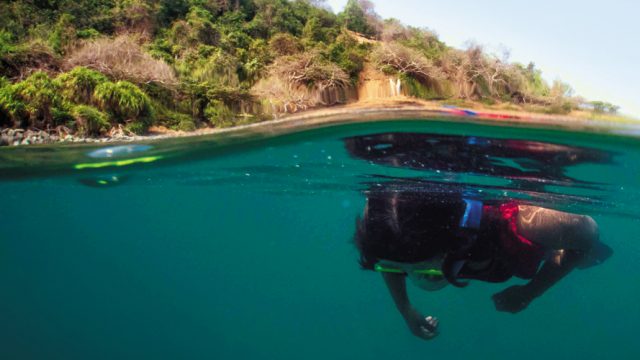In my mind, scuba diving had always associated with Goa, the Andamans and Lakshadweep, or an exotic overseas location with pristine waters, certainly not Netrani, a small island tucked into Karnataka’s coastline. This rocky outcrop in the Arabian Sea was the offbeat choice to host India’s first scuba festival (Jan 6–7) organised by Finkick Adventures and Karnataka Tourism.
Netrani is uninhabited, the seas are crystal clear, and a stunning coral reef forms the backdrop for creatures in myriad shapes, sizes and colours to swim against, protecting their secrets from the world above. Needless to say, I was agog to discover this watery wonderland .
Our base was the quiet beach and temple town of Murudeshwar, about three hours from Mangalore. We were expected at the dive centre by 7.30 am, which meant an early start. Deprived of my regular dose of caffeine, I signed the health form groggily. A one-hour ferry ride took us to the island. We were a mixed group of new and certified divers. I was, fortunately, among the former—I say fortunate because I’d heard that one’s first undersea experience can be life changing, and I wanted to find out if that was true.

We were told we’d be entering the sea by tumbling backwards from the boat. That didn’t sound very appealing, and for a moment my resolve wavered. But I forced my adventurous side to take the upper hand as I gazed at the little island. Until a decade ago, the Indian navy used Netrani for target practice. But the Karnataka High Court put a stop to this following protests by environmentalists. This biodiversity-rich area has some of the rarest species of underwater life, which abound in the coral reefs that were discovered only 12 years ago. Given the growing popularity of undersea sports in general and Netrani’s dive sites in particular, the island was swarming with people who had come from all over the country for the festival, waiting to try their hand at scuba diving or snorkelling.
The instructors gave us clear instructions about what to do in the water. We had to remember three things: breathe, equalise and relax. Equalising is basically balancing the ear pressure so that there is no pain during descent. We had to remember signs like ‘thumbs up’ to come up to the surface, ‘thumbs down’ to go below, ‘ok’ to go ahead, and ‘not ok’ to tell the instructor that we were uncomfortable—all very reminiscent of Zindagi Na Milegi Dobara.
My apprehensions peaked in the 40-minute wait before we could enter the water as there were not enough wetsuits to go around. Eventually, I was beckoned by my instructor and told to dive in my swimming costume. A buoyancy control device with a 14 kg oxygen cylinder was strapped to me, and my fins and eye mask checked. I was relieved when I was told that the cylinder would be weightless in water. Then, in what seemed a fraction of a second, my instructor was guiding me down into the ocean.

It took a few minutes to get the breathing technique right and focus on the world I had entered. As my eyes turned to the lovely, colourful creatures all around, I stopped noticing the other divers and realised how effectively the blue surface of the sea hides its secrets. There were a host of fish species—my instructor pointed out triggerfish, parrotfish, striped sergeant major, but the names did not register. I was lost in the ocean’s marvels. This was a world unlike anything I had ever experienced, calm and unreal, and I felt strangely in harmony with it. It was eerily quiet. All my intentions of capturing my first scuba experience on camera disappeared, and I handed my GoPro to the instructor to take the shots.
I was underwater for at least half an hour, though it passed in a jiffy—or, more accurately, time seems to cease to matter when you are down in the ocean. As I reluctantly surfaced, I wondered why I had been content to just lounge on beaches for so long, ignorant of the encounters that lay under the vast expanse of the sea.

The undersea glow stayed with me for hours, and back in Murudeshwar, I was content to spend the evening watching the others enjoy games like underwater hockey, spikeball and beach football.
Three dive centres, DiveGoa, Netrani Adventures and West Coast Adventures, took part in the festival. There were movie screenings and seminars, and divers participated in clean-up drives, both under the ocean and on the beach.
I don’t know when I will go scubadiving again, but my first experience has changed me in an indefinable way. These days, I find my mind slipping back to the undersea tranquility when real life overwhelms me.
The Information
Murudeshwar is easily accessible from Mangaluru (156km), Bengaluru (512km) and Goa (210km). Stay options include RNS Residency (Murudeshwar Temple Main Road; ₹3,000 per night; +91-8762471752; naveenhotels.com/rnsresidency) and Mavalli Beach Heritage Home (Murudeshwar Beach Road, Mavalli-1, Hiredomi; ₹3,500 per night; +91-9901767993; mavallibeachheritage.com). Visit netraniscubafest.com for more information.




